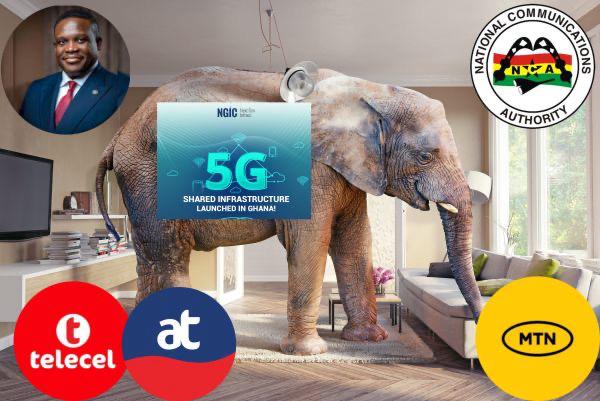On November 1, 2024, a grand ceremony at the La Palm Royal Beach Hotel marked what was billed as the launch of Ghana’s first shared 4G/5G network under an exclusive 10-year licence awarded to the Next Generation Infrastructure Company (NGIC). But contrary to public perception, this was merely ceremonial—not an operational launch. Seven months later, Ghana still has no live public 5G network.
At the time, the then Minister for Communications and Digitalisation, Ursula Owusu-Ekuful, boldly assured Ghanaians that all three telcos—MTN, Telecel, and AT Ghana—would be offering 5G services by December 2024. “The network is ready,” she said. Yet, not a single live 5G service has gone public. The timeline has since shifted—from December 2024 to January 2025, then to May, and most recently, to June 2025.
Current sector minister, Sam George, publicly stated that NGIC had assured him of a June 2025 rollout. He added that failure to meet this deadline could prompt a review of NGIC’s licensing terms. Though reluctant to cancel licences due to their financial implications, he warned that the government would not shy away from such measures if necessary.
But as June 2025 comes to a close, no 5G service is live. So what is delaying the rollout?
Operational Hurdles
Tower Deployment Lagging Behind
Minister Sam George disclosed that NGIC had committed to deploying at least 350 cell sites—200 to 250 in Accra and 100 to 150 in Kumasi, with a minimum of 50 being 5G sites. However, only 22 sites have been deployed so far. Despite the delay, all necessary equipment is reportedly in the country and warehoused, awaiting critical regulatory approvals.
Operators are hesitant to deploy equipment without assurances that telcos and ISPs can connect to the network once it goes live. As past cases like Glo’s rollout have shown, pre-emptive deployment without user adoption can be financially disastrous.
Tower Companies Still Wary
Key tower infrastructure providers—ATC and Helios Towers—have yet to finalise agreements with NGIC. Their reluctance stems from long-standing debt issues, notably AT Ghana’s GHS 1.5 billion bill to ATC. The towercos are hesitant to expose themselves to further risk without policy reform and credit assurances.
This reinforces the significance of NGIC’s neutral-host model, which is designed to consolidate infrastructure and offer shared access, thereby reducing fragmentation and financial stress in the sector. But without active regulatory intervention, this model cannot fully take shape.
Regulatory Bottlenecks
Delayed Certification and Approvals
The National Communications Authority (NCA) conducted its technical inspection of NGIC’s Network Operations Centre (NOC) weeks ago but took at least eight weeks to issue the official certification—delaying operational readiness.
Similarly, approvals for critical elements like SIM card testing (only 50 allowed so far) and Public Land Mobile Network (PLMN) configurations remain limited to test environments. Substantive authorisations for commercial rollout are still pending.
Spectrum Interference
Interference within NGIC’s allocated spectrum has also posed challenges. Notably, the Ghana Civil Aviation Authority’s (GCAA) satellite receiver interfered with NGIC’s 3.5GHz band. That issue has now been partially resolved, with GCAA shifting its operations to 3.9GHz. Testing is ongoing to confirm stability.
A more complex issue involves the 2.1GHz band, which suffers from a “raised noise floor”—a high level of background signal interference. Though the NCA has localised the problem, the exact source remains unidentified. Experts suggest possible sabotage, though no proof has surfaced.
Policy Inertia
At a recent stakeholder meeting, Minister Sam George acknowledged that the NCA had not yet granted “connecting entity” approvals to telcos like AT and Telecel, both of which are eager to tap into NGIC’s shared infrastructure.
To date:
No approvals have been issued for telcos to connect to NGIC’s platform.
No regulatory framework exists to guide ISP participation in the retail delivery of 4G/5G services via NGIC.
These omissions have rendered the NGIC platform idle, as configuration and integration with retail operators cannot proceed without them. Even if approvals were issued today, a 6–8 week lead time would be required for technical integration and testing before full launch.
Unrealistic Deadlines vs Regulatory Inaction
While the Minister’s threat to review NGIC’s licence underscores the urgency, it overlooks the fact that NGIC has yet to be granted the very tools it needs to succeed. The company’s Key Performance Indicators (KPIs) allow for a three-year ramp-up period, a timeline that must be respected given the regulatory and infrastructural hurdles involved.
What is needed now is less public pressure on NGIC and more coordinated, expedited action from regulators. Without this, the shared network model—touted as a game-changer for Ghana’s digital future—could falter before it even begins.
Strategic Benefits of the Shared Network Model
For the Regulator and Government
Reduces redundant infrastructure.
Enhances digital inclusion.
Enables transparent and policy-aligned market oversight.
For Telcos and ISPs
Grants access to nationwide infrastructure at reduced cost.
Levels the competitive playing field.
Enables expansion without capital-heavy network deployment.
For Towercos and Investors
Centralised billing and operations via NGIC reduce credit risk.
Restores market confidence through stable, transparent arrangements.
For Consumers
Brings faster, more affordable 4G and 5G access.
Improves service reliability and reach.
Increases choice through enhanced competition.
Conclusion and Call to Action
Ghana stands at a critical crossroads. Regulatory inertia must now give way to bold, coordinated action. Only then can the country reap the economic and social benefits of shared telecom infrastructure. Without swift intervention, delays could derail not just NGIC’s launch, but Ghana’s broader ambitions for digital transformation, economic competitiveness, and inclusion.
Samuel Dowuona is a multiple award-winning journalist and telecom industry analyst.
Contact: dowuonasamuel24@gmail.com
DISCLAIMER: The Views, Comments, Opinions, Contributions and Statements made by Readers and Contributors on this platform do not necessarily represent the views or policy of Multimedia Group Limited.
DISCLAIMER: The Views, Comments, Opinions, Contributions and Statements made by Readers and Contributors on this platform do not necessarily represent the views or policy of Multimedia Group Limited.


